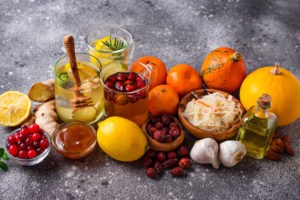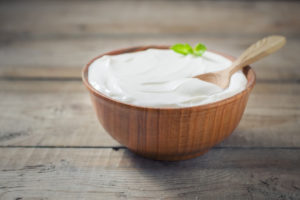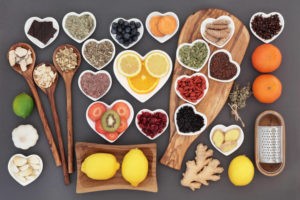The Best Foods For A Strong Immune System
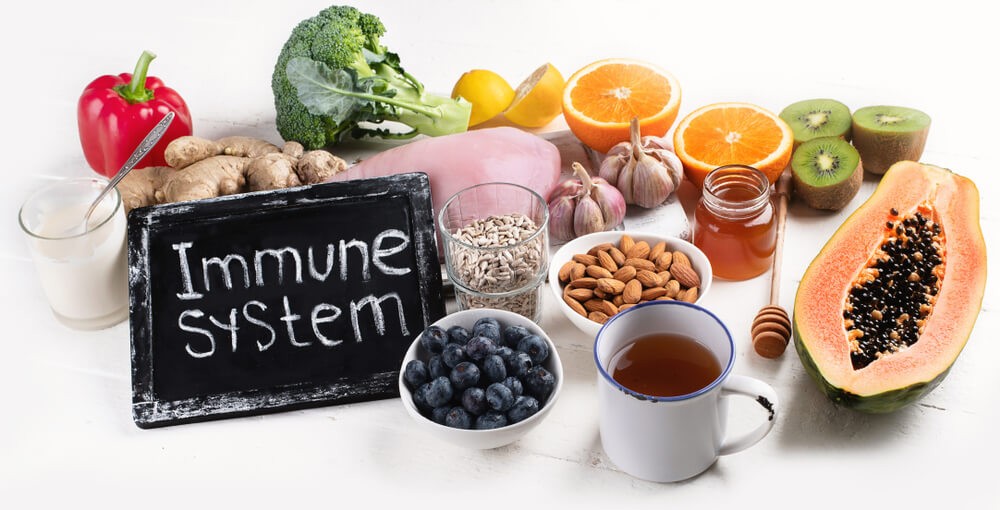
We’ve all heard the recommendations from our health professionals about how to stay healthy this time of year — such as washing your hands, not sharing food or drink, and not touching your face. But did you know that the type of foods you consume matters, as well?
When it comes to cold and flu season – or any time of year — food really can be your secret weapon to help boost your immunity, as well as protect yourself from unwanted viruses, colds and illness.
To make your immune system stronger in fighting against sickness, nutrition can be the key to winning against illness.
In this blog, NJdiet is providing our list of top foods to ensure you get
your daily allowance of important cold fighting nutrients, as well as other tips for boosting your immunity!
Immunity-Boosting Foods
Eggs
Eggs are nutritional powerhouses that are easy to incorporate into your daily routine. They are filled with protein, which is critical to the formation of bacteria and virus fighting antibodies. Eggs are one of the few food sources of vitamin D, and research has shown that vitamin D benefits your immune system, muscle function, heart health, brain development and mood.
Garlic
Garlic is recognized for fighting infections and may also help lower blood pressure and slow down hardening of the arteries. Garlic’s immune-boosting properties seem to come from a heavy concentration of sulfur-containing compounds, such as allicin.
Almonds
Nuts, such as almonds, are packed with Vitamin E and also have healthy fats. Vitamin E is key to a healthy immune system, as it is a fat-soluble vitamin, meaning it requires the presence of fat to be absorbed properly. A half-cup serving of shelled almonds provides nearly 100 percent of the recommended daily amount of vitamin E.
Citrus Fruits
Citrus fruits contain one of most well-known antioxidants, vitamin C. Vitamin C protects you from infection by increasing antibodies and boosting immunity. Studies have not confirmed that vitamin C will prevent colds, but recent research suggests the use of vitamin C may shorten the duration and severity. Because your body doesn’t produce or store it, you need daily vitamin C for continued health. Almost all citrus fruits are high in vitamin C. Popular citrus fruits include:
- grapefruit
- oranges
- tangerines
- lemons
- limes
- clementines
Ginger
Ginger may help decrease inflammation, which can help reduce inflammatory illnesses. Ginger may also help decrease nausea, decrease chronic pain and may possess cholesterol-lowering properties.
Spinach
Spinach is not just rich in vitamin C, it’s also packed with numerous antioxidants and beta carotene, which may increase the infection-fighting ability of our immune systems. Spinach is healthiest when it’s cooked as little as possible so that it retains its nutrients.
Sweet Potatoes
Sweet potatoes are chock full of vitamin A, a fat soluble vitamin that helps fight off infection. One medium sweet potato provides more than the daily recommendation for vitamin A. Since most germs invade your body through your eyes, nose, and throat, vitamin A helps keep these mucus membranes open and healthy, aiding in the fight against cold season. Vitamin A not only prevents germs from entering your body but increases your body’s immune response if they do.
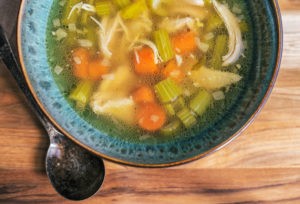
Poultry
We all turn to chicken soup when we’re feeling under the weather – as it turns out, it is more than just a feel-good food with a placebo effect. In fact, it can help improve symptoms of a cold and also protect you from getting sick. Poultry, such as chicken and turkey, is high in vitamin B-6. Vitamin B-6 is an important player in many of the chemical reactions that happen in the body. It’s also vital to the formation of new and healthy red blood cells. Stock or broth made by boiling chicken bones contains gelatin, chondroitin, and other nutrients helpful for gut healing and immunity.
Broccoli
Broccoli is a superfood, filled with vitamins and minerals. Packed with vitamins A, C, and E, as well as many other antioxidants and fiber, broccoli is one of the healthiest vegetables you can eat. Keeping its power intact is to cook it as little as possible, or better yet, eat it raw!
Papaya
Papaya is not only loaded with Vitamin C, they also have a digestive enzyme called papain that has anti-inflammatory effects. Papayas also contain great amounts of potassium, B vitamins, and folate, all of which are beneficial to your overall health.
Green And Chamomile Tea
Studies have confirmed tea’s immune-boosting effects. Researchers believe tea can fight against infection by priming the immune system for potential attacks. Green tea contains catechins, which are antioxidants found in green tea. As an extra bonus, catechins have been proven to fight prostate, colorectal and breast cancers. Chamomile tea has been deemed an immune-boosting herbal tea. Studies have shown that chamomile tea boosted antibacterial activity when 3-5 cups a day are consumed.
Shellfish
Certain types of shellfish are packed with zinc, which our bodies need so that our immune cells can function as intended. Varieties of shellfish that are high in zinc include:
- crab
- clams
- lobster
- mussels
Kiwi
Kiwis are naturally full of a ton of essential nutrients, including folate, potassium, vitamin K, and vitamin C. Vitamin C boosts white blood cells to fight infection, while kiwi’s other nutrients keep the rest of your body functioning properly.
Additional Ways To Strengthen Your Immune System
Following general good-health guidelines is the single best step you can take toward naturally keeping your immune system strong and healthy. Every part of your body, including your immune system, functions better when strengthened by healthy-living strategies such as these:
- Don’t smoke
- Exercise regularly
- Maintain a healthy weight
- If you drink alcohol, drink only in moderation
- Get adequate sleep
- Take steps to avoid infection, such as washing your hands frequently and cooking meats thoroughly
- Try to minimize stress
Vitamins And Minerals To Aid In Immunity
While it’s best to get your vitamins and minerals from food rather than pills, the Academy of Nutrition and Dietetics recommends the following nutrients for immune boosting benefits:
- Vitamin C – well known for it’s connection to boosting your immune system, vitamin C is in so many foods that most people may not need to take supplements unless a doctor advises it.
- Vitamin E – this vitamin can be a powerful antioxidant that helps your body fight off infection.
- Vitamin B6 – this important vitamin is critical in how your immune system functions.
- Vitamin A – this vitamin has an antioxidant effect to help strengthen the immune system against infection.
- Vitamin D – many people have a hard time absorbing vitamin D from food, so if you have a vitamin D deficiency, talk to your doctor about supplements.
- Folate/Folic Acid – folate is the natural form, and folic acid is the synthetic form, often added to foods because of its health benefits.
- Iron – iron which helps your body carry oxygen to cells, and comes in different forms.
- Selenium – selenium seems to have a powerful effect on the immune system, including the potential to slow the body’s over-active responses to certain aggressive forms of cancer.
- Zinc – this mineral appears to help slow down the immune response and control inflammation in your body. Keep in mind that too much zinc can actually inhibit immune system function. For adult men, the recommended amount of zinc daily is 11 milligrams (mg), and for women, it’s 8 mg.
Including adequate amounts of healthy fats and protein may also aid in boosting immunity and cold prevention.
* * *
As you can see, variety in your diet is the key to proper nutrition and immunity boosting. By paying attention to serving sizes and the recommended daily intake of vitamins and nutrients, you won’t get too much of a single vitamin and too little of others. Eating a healthful, balanced diet is just one way to support immune health, and by simply enjoying the foods above, you may aid in improving your ability to fight off illness and infection.
Eating right is a great start, and there are other things you can do to protect yourselves. It is also important to remember that the immune system is complex, so it is also essential to be mindful of the other lifestyle factors that may affect immune system health — and if you are concerned about your immune system, always speak with your doctor!
If you are ready to lose weight and get healthier, NJ
Diet is here to help! Every factor regulating metabolism, appetite, fat storage & fat burning is carefully energetically tested for success. Using DNA Testing over 40 different factors are assessed genetically. We help you not only keep the fat off, but to stay healthy.
Our program is not only aimed at promoting healthy weight loss, but aims to improve your total wellness — where the side effect is weight loss, but the end result is better overall health and well being!
When you come in for your initial evaluation and consultation at NJ
Diet, we will explain how many metabolic factors are assessed to genetically make sure you not only lose the weight, but ensures you keep it off and stay healthy for a lifetime.
Attending the Initial Evaluation and Consultation is normally $99, but by registering on our website it will only cost $27!
We welcome the opportunity for you to have a consultation with us, so register online now!

